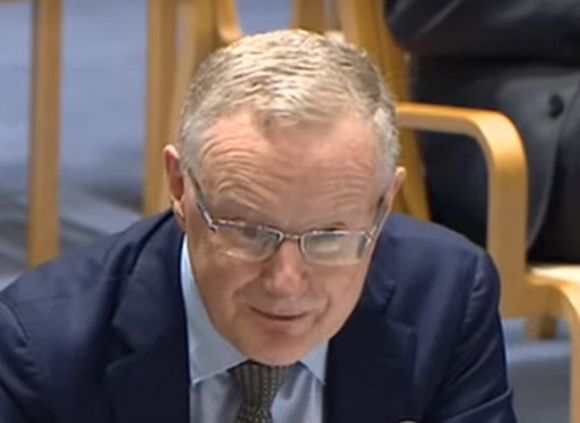Recommendations from the review of the Reserve Bank of Australia's approach to stability seem mostly procedural and lack ideas for substantive change, writes Lachlan Newland.
TREASURER Dr Jim Chalmers has released the final report of the independent Review of the Reserve Bank of Australia (RBA), the first of its kind to be commissioned for three decades.
Dr Chalmers has given in-principle support to all 51 recommendations made by the panel, the most significant of which is to split the board in two, separating the setting of interest rates from governance policy. Is this a meaningful reform?
The recommendations of the review represent mostly procedural changes to the RBA’s approach to achieving its objectives of price stability and full employment and emphatically reject any substantive changes to its broader policy aims and instruments.
With a particular emphasis on learning from international experience, it seeks to solidify the RBA’s independence from government, improve communication and transparency with the general public, and rely more on data-driven decision-making and technical expertise in a bid to rebuild trust in the institution and shape a more transparent and technocratic approach to monetary policy.
Expertise
One of the more shocking findings was that the 'Reserve Bank Board has not voted against a recommendation of the RBA executive in at least the last decade' and that current and former board members described their role as an “informed second opinion” or a “pub test” for decisions of the RBA executive.
It reasoned that:
'... the economic expertise of the Reserve Bank Board’s external members is lower than for comparable central banks... [and board members with a] deeper understanding of the financial system... [would be required to] offer alternate views on the design of the complex monetary policy tools proposed'.
To illustrate this, the highest level of educational attainment for one current member – Alison Watkins – is a Bachelor of Commerce.
In his press conference following the release of the review, current RBA governor Philip Lowe admitted:
“... the current oversight arrangements... fall short of contemporary standards."
The proposed solution is to establish a separate “monetary policy board” for setting the policy rate so that members can focus solely on research and policy development.
The review maintained that:
... the treasurer should continue to be responsible for choosing the governor and deputy governor through the conventional Cabinet processes... [but there should be a more] open and transparent appointment process... [including the development of a skills matrix with expertise in] open-economy macroeconomics, the financial system, labour markets and the supply side of the economy.
Fiscal policy
The review acknowledges the role fiscal policy plays in managing inflation and employment.
It argues:
'Any belief that these [inflation and employment] outcomes are solely under the control of monetary policy risks diminishing the responsibility of government and setting unrealistic expectations of the RBA.'
Despite this admission, the report does not advise specifically how fiscal policy should complement monetary policy.
In another section, it advised against utilising policies such as 'regulations to support market competition, increased use of price controls, financial regulation, or intervention in supply chains', claiming that these policies are not as "nimble" or easy to withdraw as monetary policy and could have 'undesired impacts' on 'competition or the efficient operation of the economy'.
This is despite the fact that the RBA meets at set intervals – which the report advised to reduce – and must wait until the next meeting to reverse any changes to the policy rate it makes, while parliament can meet whenever it likes. It is unclear exactly what these 'undesired impacts' are as the report does not elaborate further.
Independence
One of the key recommendations which have attracted criticism from the Greens is the repeal of the provision which allows the treasurer of the day to overrule decisions of the RBA board — which Greens treasury spokesperson Senator Nick McKim labelled “fundamentally anti-democratic”, although this power has never been exercised.
The provision exists as a result of a Banking Royal Commission in the late 1930s, which was called after the head of the (then central bank) Commonwealth Bank, Sir Robert Gibson, refused to issue a stimulus package during the Great Depression.
The Commission found:
'The federal parliament is ultimately responsible for monetary policy and the government of the day is the executive of the parliament… It is then the duty of the bank [RBA] to accept this assurance and to carry out the policy of the government.'
Even further, the review suggested the RBA be stripped of its power to direct the lending policies of commercial banks altogether, claiming that this power is not necessary to fulfil the RBA’s policy objectives.
Inequality
The review addressed concerns over the distributional impact of high-interest rates which results in 'businesses employ[ing] fewer people, downward pressure on wages growth [and] reducing the disposable income available after debt repayments'.
But it maintained that this only impacts 'a small proportion of workers [and is] for the benefit of sustainable economic outcomes for Australians as a whole'.
A similar approach was taken to other suggestions that the RBA consider housing affordability and climate change when making monetary policy decisions.
The review claimed that:
'... fiscal, tax and regulatory policies are best placed to best address climate change and manage the transition to a low-carbon economy.'
It also claimed that:
'... government policies are better placed to manage housing affordability… by influencing the balance of supply and demand in the housing market.'
Specifically, the panel chose not to follow the lead of the Bank of England and the European Central Bank, which favour "green" corporate bonds when engaging in balance sheet operations, or the Bank of Japan and the Reserve Bank of India, which provide directions to banks to support lending to companies supporting carbon-reduction efforts.
Its rationale was that 'there would be material risks to price stability if the central bank were to use its balance sheet to implement stimulus for climate action', although it did not elaborate further on these risks.
Alternative instruments
One small change in policy which may come about from the review is the possibility of using negative interest rates to overcome the effective lower bound constraint of the cash rate, which has been implemented in the past by Japan, Switzerland and the Eurozone.
The panel considered a paper it commissioned from Cypriot economist Athanasios Orphanides which argues that 'the successful experience with negative rates by several central banks over the past decade [justifies that this] should be considered'.
It formed the opinion that:
'... such a framework would help formalise and embed lessons from the pandemic, both from the Australian and international experience.'
Other recommendations include the addition of chief executive and communications officers, enshrining the financial stability objective in legislation, and holding similar reviews every five years.
Among those current and former parliamentarians consulted by the panel were former Coalition Treasurers Peter Costello and Josh Frydenberg, seven of the so-called Teal Independents, Greens Senator Nick McKim, and Shadow Treasurer Angus Taylor.
In his press conference following the release of the report, Dr Chalmers called for bipartisan support, claiming “these are not ideological changes”.
Shadow Treasurer Angus Taylor released a statement, arguing that bipartisan support for any changes is "essential" and the opposition will 'go through its usual party processes' before forming a view.
Lachlan Newland has worked in the public service for five years and is studying for a Bachelor of Economics at Macquarie University.
Related Articles
- Reserve Bank not to blame for rising interest rates
- Reserve Bank renovation well overdue
- Reserve Bank in danger of causing an economic recession
- Note to the Liberals: A budget surplus doesn't make sense
- The Reserve Bank Governor is completely wrong about the budget and it matters
 This work is licensed under a Creative Commons Attribution-NonCommercial-NoDerivs 3.0 Australia License
This work is licensed under a Creative Commons Attribution-NonCommercial-NoDerivs 3.0 Australia License
Support independent journalism Subscribe to IA.














